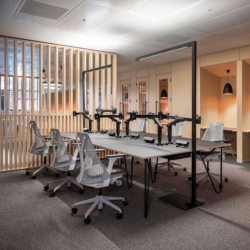February 19, 2025
Bigger and better than ever, Workspace Design Show London returns
 It’s back. The Workspace Design Show London is bigger and better than ever, with over 5,000 workplace professionals, including architects, designers, developers, and end-user occupiers, joining together to explore the present and future of workspace design and management. In just a few days, the eagerly-awaited Workspace Design Show, the trade show that brings together the UK workplace interiors community, will open its doors. Held at London’s Business Design Centre, handily placed in the heart of Islington, from 26-27 February 2025, the event offers attendees the chance to explore the latest industry trends, see the latest products, and find inspiration in the thought-provoking talks programmes. (more…)
It’s back. The Workspace Design Show London is bigger and better than ever, with over 5,000 workplace professionals, including architects, designers, developers, and end-user occupiers, joining together to explore the present and future of workspace design and management. In just a few days, the eagerly-awaited Workspace Design Show, the trade show that brings together the UK workplace interiors community, will open its doors. Held at London’s Business Design Centre, handily placed in the heart of Islington, from 26-27 February 2025, the event offers attendees the chance to explore the latest industry trends, see the latest products, and find inspiration in the thought-provoking talks programmes. (more…)



































March 5, 2025
Outdated offices are sabotaging ‘return to office’ policies
by James Campanini • Comment, Flexible working, Technology, Workplace design